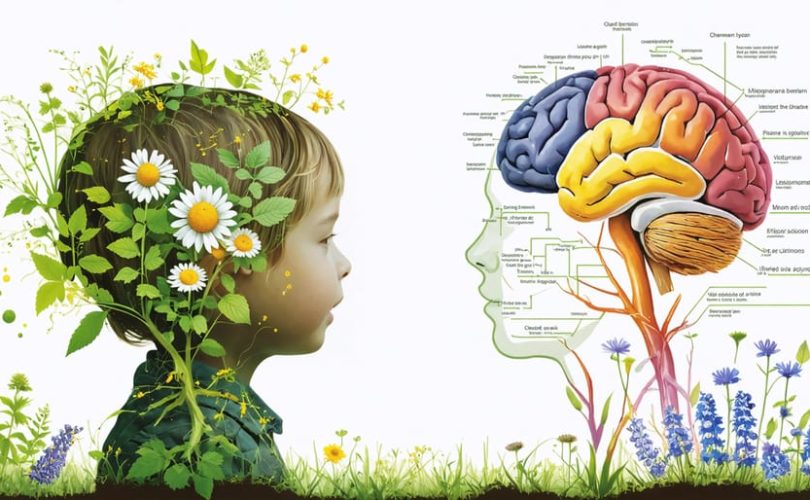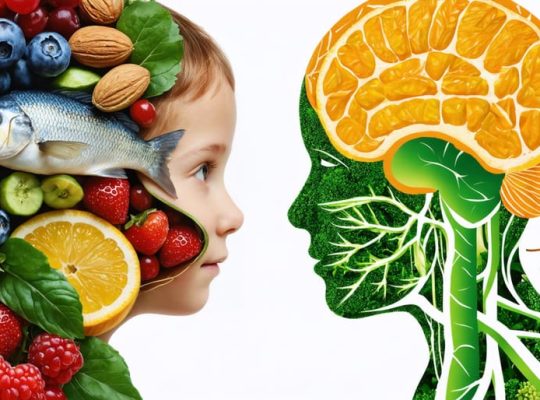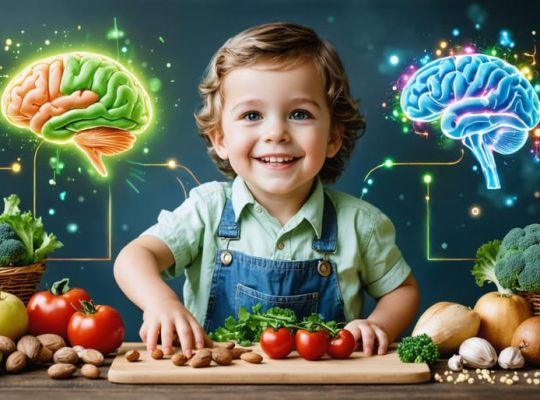Herbal remedies have supported mental wellness for thousands of years, offering natural approaches to mood, anxiety, and cognitive function. As parents and healthcare providers increasingly explore complementary treatment options, understanding the science behind herbal psychopharmacology becomes essential for making informed decisions about mental health care.
Modern research is uncovering how plant compounds interact with brain chemistry, validating many traditional uses while highlighting important safety considerations. Herbs like chamomile, passionflower, and lemon balm demonstrate measurable effects on neurotransmitter systems – the same pathways targeted by conventional medications. However, these natural options require careful evaluation, especially when considering their use in children and adolescents.
This growing field bridges ancient wisdom with contemporary neuroscience, offering evidence-based insights into how certain plants can support emotional wellbeing and cognitive performance. While herbal remedies show promise as gentle alternatives or complements to conventional treatments, professional guidance remains crucial for safe and effective use. By understanding both the potential benefits and limitations of herbal psychopharmacology, families can make more informed choices about incorporating these natural approaches into comprehensive mental health care plans.
Understanding these scientific foundations helps create a balanced perspective on herbal medicines’ role in supporting mental wellness, while emphasizing the importance of working with qualified healthcare providers to ensure safe, appropriate use.
Understanding Herbal Psychopharmacology in Children
How Herbal Remedies Affect the Young Brain
Children’s brains respond differently to herbal remedies compared to adult brains, primarily because their nervous systems are still developing. Understanding these differences is crucial when considering herbal treatments for young ones. Research shows that the relationship between brain development and nutrition is particularly sensitive during childhood years.
Young brains typically process herbs more intensely due to their enhanced blood-brain barrier permeability. This means that even small doses can have stronger effects than in adults. For example, calming herbs like chamomile might work more quickly in children, while stimulating herbs could have more pronounced effects.
Dr. Sarah Chen, a pediatric neurologist, explains: “Children’s developing brains are like sponges – they absorb and react to substances more readily than adult brains. This makes it essential to be extra careful with dosing and selection of herbal remedies.”
Parents should always remember that natural doesn’t automatically mean safe. Every child responds uniquely to herbal treatments, and what works well for one child might not be suitable for another. Always consult with healthcare providers before starting any herbal treatment regimen.
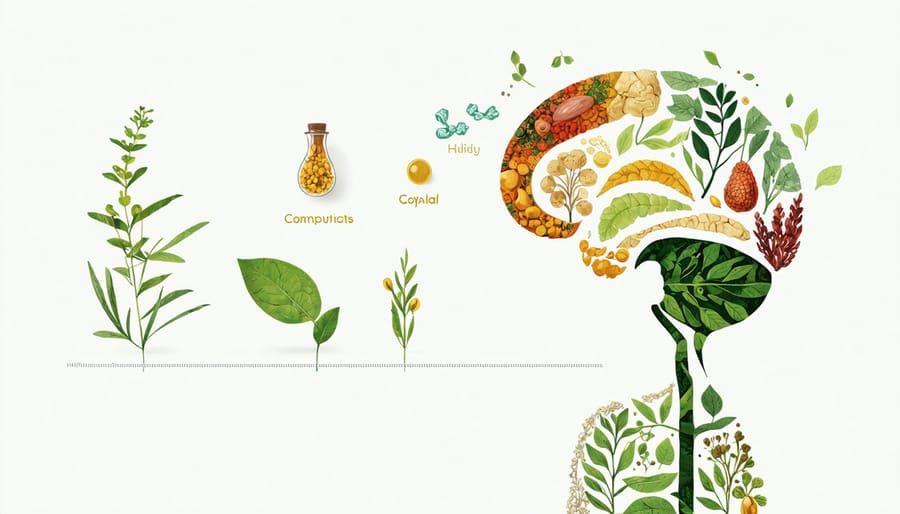
Safety Considerations for Growing Bodies
Children’s developing bodies process herbs differently than adults, making safety considerations especially important. Their faster metabolism, developing organs, and unique body chemistry can lead to unexpected reactions to herbal supplements. What might be gentle for an adult could be too potent for a growing child.
Dr. Sarah Chen, a pediatric herbalist, explains: “Children’s liver enzymes are still developing, which affects how they break down active compounds. We need to be particularly cautious with dosing and interactions.”
Key safety points to consider include:
– Starting with minimal doses and observing reactions carefully
– Checking for potential interactions with medications or supplements
– Using age-appropriate formulations
– Considering the child’s weight and development stage
– Being aware of any existing health conditions
Parents should always consult healthcare providers before introducing any herbal supplements. Some herbs that are traditionally considered safe for adults may need to be avoided or modified for children. Keep detailed records of any reactions, and stop use immediately if you notice any concerning changes in behavior, sleep patterns, or physical symptoms.
Remember that each child is unique, and what works well for one may not be suitable for another.
Common Herbal Remedies for Children’s Mental Health
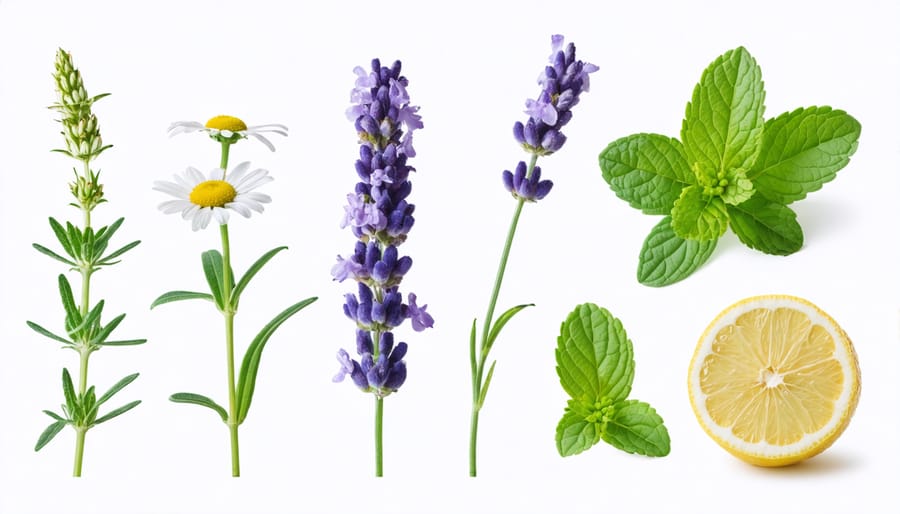
Calming Herbs for Anxiety
Nature offers several gentle herbs that can help ease anxiety and promote relaxation, particularly when combined with other mind-body approaches. Chamomile, often enjoyed as a soothing tea, has been used for centuries to calm nerves and support better sleep. Many parents find that a warm cup of chamomile tea becomes a comforting bedtime ritual for their children.
Lavender is another well-loved herb that can help reduce anxiety through its gentle aromatherapeutic properties. Whether used in a bath, as an essential oil in a diffuser, or dried in a small sachet under a pillow, lavender’s calming scent can help create a more peaceful environment.
Lemon balm, a member of the mint family, offers mild mood-lifting properties while promoting relaxation. It’s particularly helpful when combined with chamomile and can be prepared as a pleasant-tasting tea that children often enjoy.
Passionflower is valued for its ability to ease nervous tension and support healthy sleep patterns. While traditionally used by adults, many herbalists recommend it in appropriate doses for older children under professional guidance.
Remember that while these herbs are generally gentle, it’s essential to consult with a healthcare provider before introducing any herbal remedies, especially for children. They can help determine proper dosing and ensure there are no interactions with other medications or treatments.
Focus and Attention Support
Many parents and educators seek natural ways to support their children’s focus and attention. Traditional herbal medicine offers several well-studied options that may help enhance concentration and mental clarity. Ginkgo biloba, one of the oldest living tree species, has been used for centuries to support cognitive function and memory. Research suggests it may improve blood flow to the brain and act as an antioxidant.
Another popular herb is Bacopa monnieri, traditionally used in Ayurvedic medicine. Studies indicate it may help improve memory formation and reduce anxiety, particularly beneficial for children struggling with focus-related challenges. Parents often appreciate that Bacopa’s effects tend to be gentle and gradual.
Lemon balm, a member of the mint family, offers a gentle calming effect while supporting concentration. Its pleasant taste makes it especially suitable for children, often served as a tea. Similarly, peppermint has shown promise in enhancing alertness and mental performance.
Dr. Sarah Chen, a pediatric herbalist, shares: “I’ve seen remarkable improvements in children’s attention spans when using appropriate herbs alongside proper nutrition and sleep habits. However, it’s crucial to work with a healthcare provider to ensure safety and proper dosing.”
Remember that herbs can interact with medications and aren’t suitable for everyone. Always consult with a qualified healthcare provider before starting any herbal regimen, especially for children.
Mood-Supporting Botanicals
Nature offers several gentle botanical allies that can support emotional well-being in children and adults alike. Just as we understand the nutritional impact on mental health, certain herbs have been traditionally used to promote calm and emotional balance.
Chamomile, perhaps the most familiar mood-supporting herb, has long been appreciated for its gentle calming properties. Many parents already include it in their children’s bedtime routine through herbal teas. Lemon balm, with its pleasant citrusy aroma, is another mild herb that herbalists often recommend for promoting peaceful feelings and supporting focus.
Lavender, whether used in tea or as an aromatherapeutic tool, has been shown to help create a sense of tranquility. Many families find that adding a few drops of lavender essential oil to a bedroom diffuser helps create a soothing environment for rest and relaxation.
Passionflower and skullcap are two other traditional botanicals that herbalists suggest for emotional support, though these should only be used under professional guidance. As with any herbal remedy, it’s essential to consult with a qualified healthcare provider before introducing these botanicals into your child’s wellness routine, as even natural substances can interact with medications or have unexpected effects in sensitive individuals.

Working with Healthcare Providers
Finding Qualified Practitioners
Finding a qualified practitioner who understands both herbal medicine and mental health requires careful consideration. Start by seeking recommendations from trusted healthcare providers who embrace holistic treatment approaches. Look for practitioners with recognized credentials in herbalism, such as Registered Herbalists (RH) or those with certifications from respected herbal medicine institutions.
When evaluating potential practitioners, ask about their experience working with children and mental health conditions specifically. A qualified provider should be willing to collaborate with your child’s primary healthcare team and should thoroughly discuss your child’s medical history, current medications, and treatment goals.
Good practitioners will take time to explain their approach, discuss potential interactions between herbs and medications, and create personalized treatment plans. They should also be open to questions and provide clear information about the herbs they recommend, including potential side effects and proper dosing.
Remember to verify their licensing status and check reviews from other families. Most importantly, trust your instincts – the right practitioner should make both you and your child feel comfortable and heard.
Important Questions to Ask
When discussing herbal remedies with your healthcare provider, it’s essential to have an open and honest conversation. Here are key questions to bring to your appointment:
“What interactions could this herb have with current medications?” This is crucial, as many herbs can affect how prescription medicines work.
“Has this herb been studied in children?” Since many herbal studies focus on adults, understanding the research specific to children is important.
“What are the recommended dosages for my child’s age and weight?” Proper dosing is critical for safety and effectiveness.
“How long should we try this treatment before expecting results?” Understanding the timeline helps set realistic expectations.
“What side effects should we watch for?” Know what’s normal and what might signal a problem.
“Are there any quality certifications I should look for when buying this herb?” This helps ensure you’re getting safe, reliable products.
“Should we stop using this herb before any medical procedures?” Some herbs can affect surgery outcomes or diagnostic tests.
Remember to share any other supplements or herbal remedies your child is currently taking, as this information helps your healthcare provider make safer recommendations.
Safety and Quality Considerations
Selecting Quality Products
When choosing herbal supplements for mental health support, quality and safety should be your top priorities. Start by selecting products from reputable manufacturers who follow Good Manufacturing Practices (GMP) and have their products tested by independent laboratories. Look for supplements that clearly list all ingredients, including the exact amount of each herb, on the label.
Choose standardized herbal extracts whenever possible, as these provide consistent amounts of active compounds. Be wary of products that make extravagant claims or promise instant results – reliable manufacturers typically use more measured language about their products’ benefits.
Check for quality certifications from recognized organizations like USP (United States Pharmacopeia) or NSF International. These indicate that the product has undergone rigorous testing for purity and potency. Additionally, look for supplements that include lot numbers and expiration dates, which help ensure freshness and traceability.
Consider the form of the herb – some compounds are better absorbed as tinctures, while others work well as capsules or tablets. Fresh herbs should have vibrant colors and strong, characteristic aromas. Avoid products with artificial colors, unnecessary fillers, or preservatives.
Always purchase supplements from established retailers or directly from manufacturers with solid reputations. While it may be tempting to choose cheaper alternatives, investing in quality products from trusted sources helps ensure both safety and effectiveness.
Remember to consult with a healthcare provider before starting any herbal supplement regimen, as they can help evaluate product quality and potential interactions with other medications.
Potential Interactions and Side Effects
While herbal remedies are often perceived as gentle and natural, they can interact significantly with conventional medications and may cause unexpected side effects. It’s crucial to understand these potential risks before starting any herbal treatment for mental health conditions.
Some common herbs like St. John’s Wort can interact with antidepressants, potentially leading to a dangerous condition called serotonin syndrome. Similarly, Kava may increase the effects of anti-anxiety medications and shouldn’t be combined with alcohol or other sedatives.
Warning signs to watch for when using herbal remedies include:
– Unusual drowsiness or agitation
– Changes in heart rate or blood pressure
– New or worsening anxiety or depression
– Digestive problems
– Allergic reactions
– Headaches or dizziness
Children, pregnant women, and individuals with existing health conditions need to be especially cautious with herbal treatments. What works safely for one person might cause problems for another due to individual differences in metabolism and sensitivity.
Always inform your healthcare provider about any herbal supplements you’re considering. They can help evaluate potential interactions with your current medications and monitor for adverse effects. Keep a detailed record of any symptoms or changes you notice when starting a new herbal remedy, and don’t hesitate to seek immediate medical attention if you experience concerning reactions.
Remember that “natural” doesn’t always mean safe, and proper guidance from healthcare professionals is essential for using herbal remedies effectively and safely.
As we’ve explored throughout this article, herbal psychopharmacology offers promising potential for supporting mental health, but it requires careful consideration and professional guidance. While many herbs have demonstrated therapeutic benefits through traditional use and scientific research, their effectiveness and safety profiles can vary significantly from person to person.
Remember that herbal remedies, despite their natural origins, are powerful substances that can interact with medications and affect body chemistry. What works well for one individual may not be suitable for another, especially when dealing with complex mental health conditions.
The key to successful herbal treatment lies in working closely with qualified healthcare providers who understand both conventional and herbal medicine. These professionals can help create personalized treatment plans that consider your specific needs, medical history, and current medications.
Parents and caregivers should be particularly cautious when considering herbal remedies for children and adolescents. Always consult with pediatric specialists who have experience in integrative medicine before starting any herbal treatment regimen.
As research in herbal psychopharmacology continues to evolve, staying informed through reliable sources and maintaining open communication with healthcare providers becomes increasingly important. By taking a balanced, well-informed approach under professional guidance, herbal remedies can be safely integrated into comprehensive mental health care plans, potentially offering valuable support for overall wellbeing.

